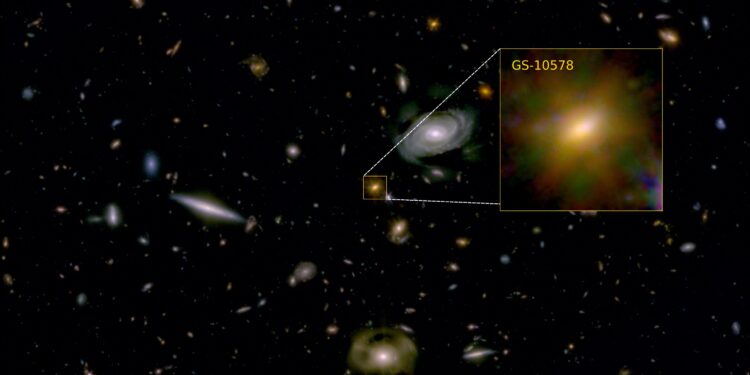Astronomers have used the NASA/ESA James Webb Space Telescope to confirm that supermassive black holes can starve their host galaxies of the fuel they need to form new stars. The international team, co-led by the University of Cambridge, used Webb to observe a Milky Way-sized galaxy in the early universe, about two billion years after the Big Bang. Like most large galaxies, it has a supermassive black hole at its centre. However, this galaxy is essentially “dead”: it has virtually stopped forming new stars. Credit: Francesco D’Eugenio
Astronomers have used the NASA/ESA James Webb Space Telescope to confirm that supermassive black holes can starve their host galaxies of the fuel they need to form new stars. The findings are published in the journal Astronomy of nature.
The international team, co-led by the University of Cambridge, used Webb to observe a galaxy the size of the Milky Way in the early Universe, about two billion years after the Big Bang. Like most large galaxies, it has a supermassive black hole at its center. However, this galaxy is essentially “dead”: it has virtually stopped forming new stars.
“Based on previous observations, we knew that this galaxy was in a quenched state: it’s not forming many stars given its size, and we think there’s a link between the black hole and the end of star formation,” said co-lead author Dr Francesco D’Eugenio, from the Kavli Institute for Cosmology in Cambridge.
“However, until Webb, we have not been able to study this galaxy in sufficient detail to confirm this link, and we do not know whether this state of extinction is temporary or permanent.”
This galaxy, officially named GS-10578 but nicknamed “Pablo’s galaxy” after the colleague who decided to observe it in detail, is massive for such an ancient period in the universe: its total mass is about 200 billion times the mass of our sun, and most of its stars formed between 12.5 and 11.5 billion years ago.
“In the early universe, most galaxies formed many stars, so it’s interesting to see a dead galaxy that was so massive at that time,” said study co-author Professor Roberto Maiolino, also a member of the Kavli Institute for Cosmology. “If it had had enough time to grow to that massive size, the process that stopped star formation probably happened relatively quickly.”
Using Webb, the researchers detected that this galaxy is expelling large amounts of gas at a speed of about 1,000 kilometers per second, which is fast enough to escape the galaxy’s gravitational pull. These fast winds are “pushed” out of the galaxy by the black hole.
Like other galaxies containing accreting black holes, Pablo’s Galaxy is traversed by fast winds of hot gas, but these gas clouds are tenuous and have little mass. Webb has detected the presence of a new component of wind, which had not been observed with previous telescopes. This gas is colder, which means that it is denser and, importantly, that it does not emit any light. Webb, thanks to its superior sensitivity, can see these dark gas clouds because they block some of the light from the galaxy behind them.
The mass of gas ejected from the galaxy is greater than what the galaxy would need to continue forming new stars. In essence, the black hole starves the galaxy until it dies.
“We found the culprit,” D’Eugenio said. “The black hole is killing this galaxy and keeping it dormant, cutting off the source of ‘food’ the galaxy needs to form new stars.”
Although previous theoretical models had predicted that black holes had this effect on galaxies, before Webb it had not been possible to detect this effect directly.
Previous models had predicted that the end of star formation would have a violent and turbulent effect on galaxies, destroying their shape in the process. But the stars in this disk-shaped galaxy still move in an orderly fashion, suggesting that this is not always the case.
“We knew that black holes had a huge impact on galaxies and that it might be common for them to stop star formation, but until Webb we weren’t able to confirm this directly,” Maiolino said. “Webb represents a giant leap forward in terms of our ability to study the early universe and its evolution.”
New observations with the Atacama Large Millimeter-Submillimeter Array (ALMA), targeting the coldest and darkest gaseous components of the galaxy, will tell us more about whether and where fuel for star formation is still hidden in this galaxy, and what effect the supermassive black hole has in the region surrounding the galaxy.
More information:
A post-explosion galaxy of rapidly rotating stars quenched by feedback from a supermassive black hole at z=3, Astronomy of nature (2024). DOI: 10.1038/s41550-024-02345-1. www.nature.com/articles/s41550-024-02345-1
Provided by the University of Cambridge
Quote: Astronomers detect black hole ‘starving’ its host galaxy (2024, September 16) retrieved September 16, 2024 from
This document is subject to copyright. Apart from any fair dealing for the purpose of private study or research, no part may be reproduced without written permission. The content is provided for informational purposes only.



